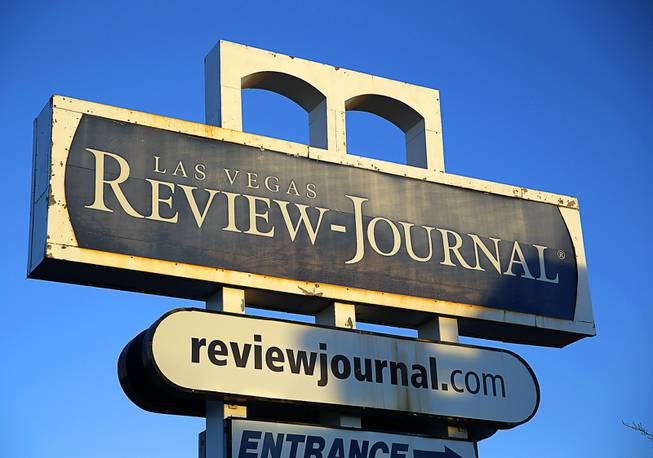
John Locher / AP
This Dec. 17, 2015, file photo shows a sign outside the building housing the Las Vegas Review-Journal in Las Vegas.
Friday, Sept. 17, 2021 | 2 a.m.
The Nevada Supreme Court affirmed an arbitrator’s decision ordering the Las Vegas Review-Journal to pay the Las Vegas Sun for violating terms of a joint operating agreement between the organizations.
Leif Reid, the Sun’s attorney, said the amount of the award would be close to $2.1 million.
At issue was how the Review-Journal calculated payments to the Sun under the agreement. According to the JOA, the Sun is entitled to 10% of the joint profits of the operations of the newspapers.
The arbitrator’s ruling in 2019, which stemmed from a lawsuit filed by the Sun, found the Review-Journal’s practices of charging newsroom expenses to the JOA deprived the Sun of millions of dollars in annual profit-sharing payments to which it was entitled under terms of the agreement. Reid said the R-J had expensed $10 million or more for its editorial costs in determining its annual payment to the Sun
“The Review-Journal can’t deprive the Sun of that money anymore,” Reid said. “For the next 20 years, the Sun will receive those additional dollars to help fund its operation.”
Six of the court’s seven justices signed the decision, which was dated Thursday. Justice Kristina Pickering recused herself from the case because her husband, attorney Steve Morris, has represented the Review-Journal in the past. Morris no longer represents the newspaper.
The court also affirmed the arbitrator’s ruling that the Review-Journal violated the JOA by not including the Sun in promotional and marketing materials, and agreed with the arbitrator that the Sun would be able to audit the Review-Journal books to verify what it was owed under the JOA after Sheldon Adelson, the billionaire casino magnate and GOP benefactor, purchased the newspaper in late 2015. Adelson died in January; his family still owns the Review-Journal.
The court additionally affirmed the arbitrator’s decision denying the Sun’s request to collect legal fees from the Review-Journal in the case.
Justice Lidia S. Stiglich, writing for the court, said plaintiffs “had high bars to clear. Under well-settled law, an arbitration award can only be overturned for very limited reasons, and a mere error is not one of those reasons.” Neither party cleared the high bar, the court ruled.
“(T)he parties alleged numerous errors, but none of those errors support vacatur or modification under the narrow statutory or common-law grounds stated above,” Stiglich wrote. “Thus the district court’s order confirming the arbitration award is affirmed.”
The JOA between the Sun and the Review-Journal was created under the Newspaper Preservation Act, approved by Congress in the 1970s. That legislation provides limited antitrust protection for newspapers to combine business functions while remaining editorially independent.
Under the JOA between the two news agencies, the Review-Journal publishes and distributes the Sun, with the two newspapers packaged and delivered together.
The Sun does not accept advertising in its print publication under the agreement, but receives a portion of the advertising and circulation revenues from the Sun/Review-Journal product. The two papers operate completely independently of each other in their news and editorial functions.
The Review-Journal in 2019 filed a counterclaim attempting to dissolve the JOA, under which the Review-Journal and the Sun have operated since 1989. The counterclaim was in reaction to the Sun’s suit accusing the Review-Journal of changing its front page and diminishing the Sun’s presence on it in a manner not allowed under the agreement.
When the Review-Journal announced its plans for a counterclaim, the Sun went to federal court and filed suit saying this effort and other Review-Journal actions constituted an attempt to create an illegal news monopoly in Clark County.
The antitrust action alleges Adelson was attempting to stop the Sun from publishing and silence its countering editorial voice in Southern Nevada.
“We think it was clear to the arbitrator, the District Court, everyone who looked at this,” Reid said. “We think the Review-Journal knew that what they were doing was wrong. We think it was part of an intentional effort to harm the Sun competitively.”
The funds awarded by the arbitrator were previously set aside by the Review-Journal in the form of a bond that is controlled by the court. The Review-Journal has 30 days from the time of the ruling to make payment, Reid said.
When reached via email Thursday evening, Benjamin Lipman, vice president of legal affairs and general counsel for the R-J, said he was still reviewing the ruling.
